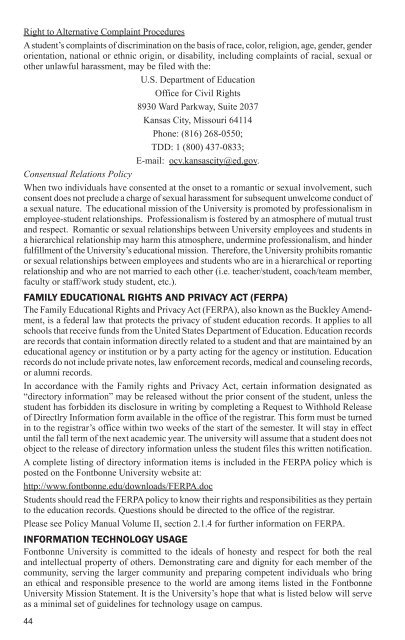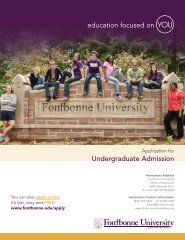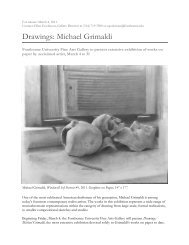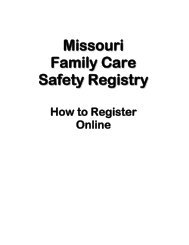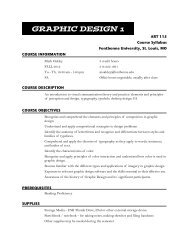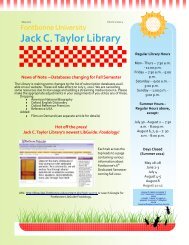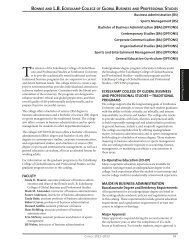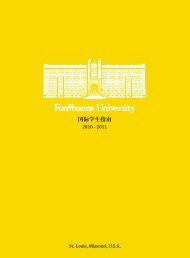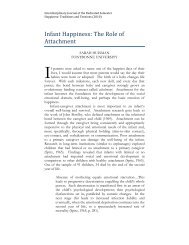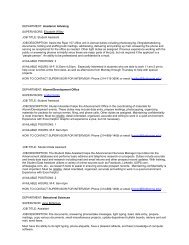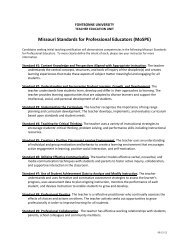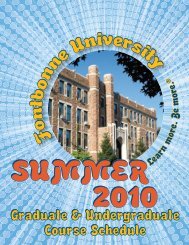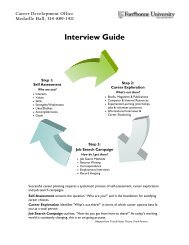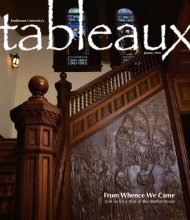Click here (pdf, 891.09KB) - Fontbonne University
Click here (pdf, 891.09KB) - Fontbonne University
Click here (pdf, 891.09KB) - Fontbonne University
You also want an ePaper? Increase the reach of your titles
YUMPU automatically turns print PDFs into web optimized ePapers that Google loves.
Right to Alternative Complaint Procedures<br />
A student’s complaints of discrimination on the basis of race, color, religion, age, gender, gender<br />
orientation, national or ethnic origin, or disability, including complaints of racial, sexual or<br />
other unlawful harassment, may be filed with the:<br />
U.S. Department of Education<br />
Office for Civil Rights<br />
8930 Ward Parkway, Suite 2037<br />
Kansas City, Missouri 64114<br />
Phone: (816) 268-0550;<br />
TDD: 1 (800) 437-0833;<br />
E-mail: ocv.kansascity@ed.gov.<br />
Consensual Relations Policy<br />
When two individuals have consented at the onset to a romantic or sexual involvement, such<br />
consent does not preclude a charge of sexual harassment for subsequent unwelcome conduct of<br />
a sexual nature. The educational mission of the <strong>University</strong> is promoted by professionalism in<br />
employee-student relationships. Professionalism is fostered by an atmosp<strong>here</strong> of mutual trust<br />
and respect. Romantic or sexual relationships between <strong>University</strong> employees and students in<br />
a hierarchical relationship may harm this atmosp<strong>here</strong>, undermine professionalism, and hinder<br />
fulfillment of the <strong>University</strong>’s educational mission. T<strong>here</strong>fore, the <strong>University</strong> prohibits romantic<br />
or sexual relationships between employees and students who are in a hierarchical or reporting<br />
relationship and who are not married to each other (i.e. teacher/student, coach/team member,<br />
faculty or staff/work study student, etc.).<br />
FAMily eduCAtionAl riGhts And privACy ACt (FerpA)<br />
The Family Educational Rights and Privacy Act (FERPA), also known as the Buckley Amendment,<br />
is a federal law that protects the privacy of student education records. It applies to all<br />
schools that receive funds from the United States Department of Education. Education records<br />
are records that contain information directly related to a student and that are maintained by an<br />
educational agency or institution or by a party acting for the agency or institution. Education<br />
records do not include private notes, law enforcement records, medical and counseling records,<br />
or alumni records.<br />
In accordance with the Family rights and Privacy Act, certain information designated as<br />
“directory information” may be released without the prior consent of the student, unless the<br />
student has forbidden its disclosure in writing by completing a Request to Withhold Release<br />
of Directlry Information form available in the office of the registrar. This form must be turned<br />
in to the registrar’s office within two weeks of the start of the semester. It will stay in effect<br />
until the fall term of the next academic year. The university will assume that a student does not<br />
object to the release of directory information unless the student files this written notification.<br />
A complete listing of directory information items is included in the FERPA policy which is<br />
posted on the <strong>Fontbonne</strong> <strong>University</strong> website at:<br />
http://www.fontbonne.edu/downloads/FERPA.doc<br />
Students should read the FERPA policy to know their rights and responsibilities as they pertain<br />
to the education records. Questions should be directed to the office of the registrar.<br />
Please see Policy Manual Volume II, section 2.1.4 for further information on FERPA.<br />
inForMAtion teChnoloGy usAGe<br />
<strong>Fontbonne</strong> <strong>University</strong> is committed to the ideals of honesty and respect for both the real<br />
and intellectual property of others. Demonstrating care and dignity for each member of the<br />
community, serving the larger community and preparing competent individuals who bring<br />
an ethical and responsible presence to the world are among items listed in the <strong>Fontbonne</strong><br />
<strong>University</strong> Mission Statement. It is the <strong>University</strong>’s hope that what is listed below will serve<br />
as a minimal set of guidelines for technology usage on campus.<br />
All users of the <strong>University</strong> computer facilities must agree to use the facilities legally and ethically<br />
and in keeping with their intended use. Computing facilities are recognized as <strong>University</strong><br />
resources. Each computer user, t<strong>here</strong>fore, is expected to act responsibly so as not to violate the<br />
rights of others. Employees and students are reminded that they must abide by the following<br />
computer policies. These policies are found in the faculty/staff manuals, in the <strong>Fontbonne</strong><br />
<strong>University</strong> Student Handbook and in the Offices of Student Affairs and information technology.<br />
<strong>Fontbonne</strong> <strong>University</strong> reserves the right to protect the integrity of its computing systems,<br />
workstations and academic lab facilities.<br />
U.S. and Missouri state laws<br />
No person may use <strong>Fontbonne</strong> <strong>University</strong>’s computing resources for any illegal or unauthorized<br />
act. In particular, individuals may not use computing resources to violate any state or federal<br />
laws or any regulation of <strong>Fontbonne</strong> <strong>University</strong>. These actions include, but are not limited to<br />
the following:<br />
• Violating copyright laws and/or software agreements-When in doubt, do not copy.<br />
• Creating, disseminating or possessing legally obscene material or other illegal documents<br />
or images.<br />
• Using <strong>University</strong> resources to harass or threaten others.<br />
• Violating the statutes 569.093-569.099 Cum Supp RSMO 1992<br />
• Tampering with computer data<br />
• Tampering with computer equipment<br />
• Tampering with computer users<br />
Anyone violating these statutes may be criminally charged with a misdemeanor or felony and<br />
may also be liable for compensatory damages and attorney’s fees in a civil lawsuit. (537.525<br />
RSMO Cum Supp 1992).<br />
Computer use standards of conduct<br />
All users of the <strong>University</strong>’s computing equipment and services are expected to observe the<br />
rights of other users and behave in an ethical manner. Examples of unacceptable behavior<br />
includes:<br />
• Using the <strong>University</strong> network or other computer facilities for financial gain<br />
• Damaging hardware or software belonging to the <strong>University</strong> or others<br />
• Sending, displaying, printing, or playing obscene messages or images, including those<br />
received through e-mail in a public setting<br />
• Displaying, sending or printing messages that harass an individual or group because of their<br />
race, color, religion, age, gender, gender orientation, national or ethnic origin or disability<br />
or any other protected status.<br />
• Accessing the private computer files of other users<br />
• Using an account owned by another user or allowing another user to use your account<br />
• Interfering in any way with another’s use of the <strong>University</strong>’s equipment or services,<br />
including any disruptive use of video or audio media in the labs<br />
• Deleting software, data or communications belonging to the <strong>University</strong> or others<br />
• Posting anonymous messages<br />
• Posting personal communication without the original author’s consent<br />
• Vandalizing the data of another user<br />
• Knowingly introducing a computer virus or other destructive program<br />
• Wasting limited resources, such as unnecessary printing, making electronic mass mailings<br />
for non collegiate business, monopolizing machines, disproportionately using CPU,<br />
memory, disk space, or network bandwidth.<br />
• Sending personal information, without express approval, about faculty, students, or staff<br />
to third parties, including members of chat groups.<br />
44 45


